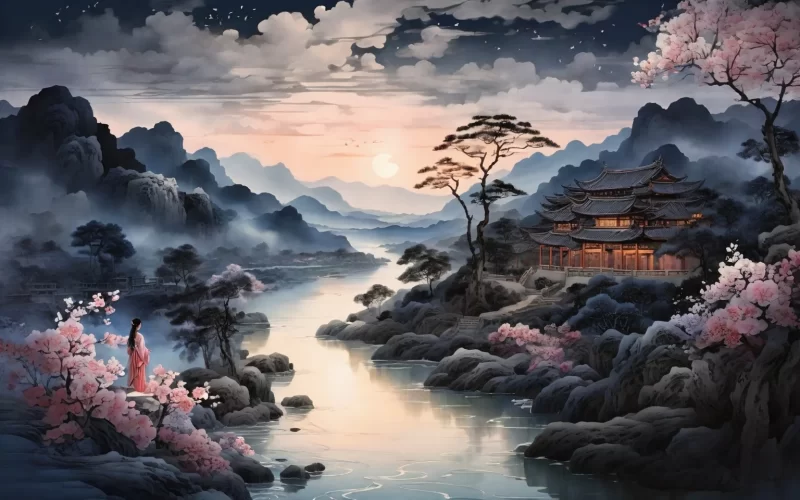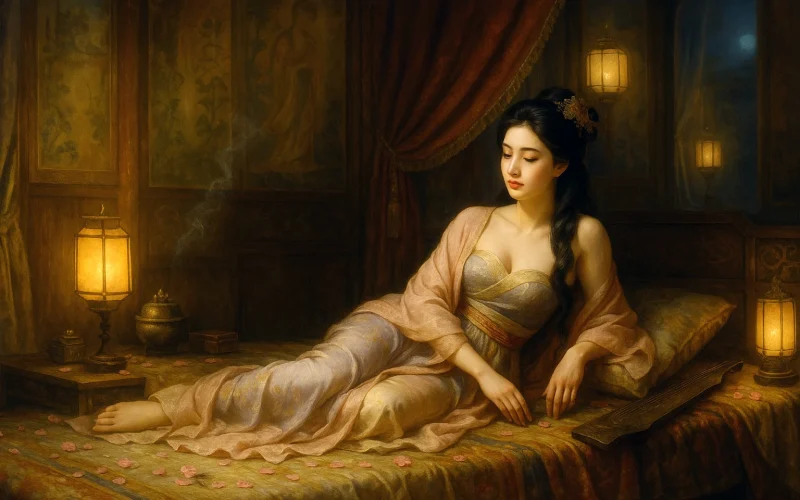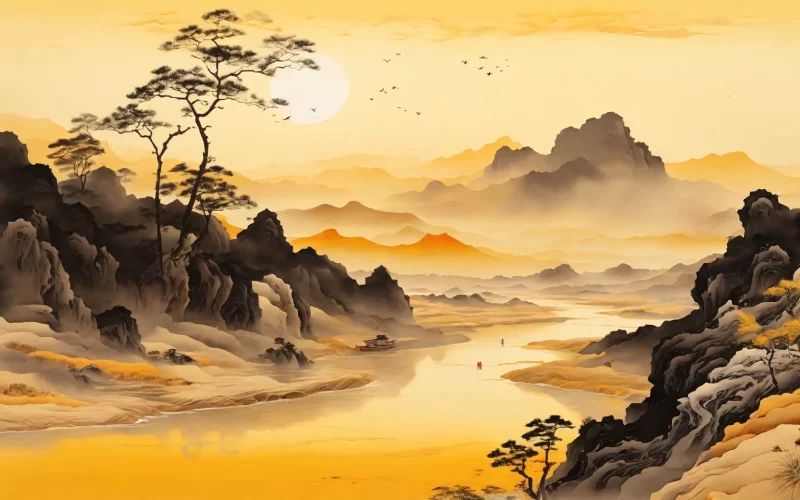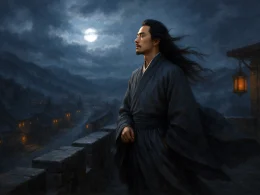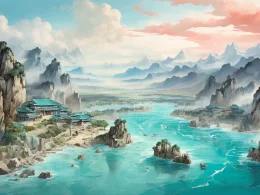In spring the river rises as high as the sea,
And with the river's tide uprises the moon bright.
She follows the rolling waves for ten thousand li;
Where'er the river flows, there overflows her light.
The river winds around the fragrant islet where
The blooming flowers in her light all look like snow.
You cannot tell her beams from hoar frost in the air,
Nor from white sand upon Farewell Beach below.
No dust has stained the water blending with the skies;
A lonely wheel-like moon shines brilliant far and wide.
Who by the riverside did first see the moon rise?
When did the moon first see a man by riverside?
Many generations have come and passed away;
From year to year the moons look alike, old and new.
We do not know tonight for whom she sheds her ray,
But hear the river say to its water adieu.Away,
away is sailing a single cloud white;
On Farewell Beach are pining away maples green.
Where is the wanderer sailing his boat tonight?
Who, pining away, on the moonlit rails would lean?
Alas! The moon is lingering over the tower;
It should have seen her dressing table all alone.
She may roll curtains up, but light is in her bower;
She may wash, but moonbeams still remain on the stone.
She sees the moon, but her husband is out of sight;
She would follow the moonbeams to shine on his face.
But message-bearing swans can't fly out of moonlight,
Nor letter-sending fish can leap out of their place.
He dreamed of flowers falling o'er the pool last night;
Alas! Spring has half gone, but he can't homeward go.
The water bearing spring will run away in flight;
The moon over the pool will sink low.
In the mist on the sea the slanting moon will hide;
It's a long way from northern hills to southern streams.
How many can go home by moonlight on the tide?
The setting moon sheds o'er riverside trees but dreams.
Original Poem
「春江花月夜」
张若虚
春江潮水连海平,海上明月共潮生。
滟滟随波千万里,何处春江无月明!
江流宛转绕芳甸,月照花林皆似霰。
空里流霜不觉飞,汀上白沙看不见。
江天一色无纤尘,皎皎空中孤月轮。
江畔何人初见月?江月何年初照人?
人生代代无穷已,江月年年望相似。
不知江月待何人,但见长江送流水。
白云一片去悠悠,青枫浦上不胜愁。
谁家今夜扁舟子?何处相思明月楼?
可怜楼上月徘徊,应照离人妆镜台。
玉户帘中卷不去,捣衣砧上拂还来。
此时相望不相闻,愿逐月华流照君。
鸿雁长飞光不度,鱼龙潜跃水成文。
昨夜闲潭梦落花,可怜春半不还家。
江水流春去欲尽,江潭落月复西斜。
斜月沉沉藏海雾,碣石潇湘无限路。
不知乘月几人归,落月摇情满江树。
Interpretation
"A Moonlit Night on the Spring River" by Zhang Ruoxu stands as an immortal masterpiece, its very title—composed of five poetic elements: "spring," "river," "flowers," "moon," and "night"—conjuring a world where celestial rhythms, earthly landscapes, natural beauty, luminous hues, and temporal moments harmonize into transcendent artistry. This panoramic work blends natural description, emotional expression, and philosophical contemplation, showcasing early Tang poets' visionary aesthetic ideals that transcended their era. The poem unfolds through five interconnected movements, together forming a cosmic tapestry interweaving universal consciousness with human sentiment.
First Movement: The Spring River's Moonlit Panorama
春江潮水连海平,海上明月共潮生。
Chūn jiāng cháo shuǐ lián hǎi píng, hǎi shàng míng yuè gòng cháo shēng.
Spring river tides level with the sea,
On the waves, the bright moon births with the swell.
滟滟随波千万里,何处春江无月明?
Yàn yàn suí bō qiān wàn lǐ, hé chù chūn jiāng wú yuè míng?
Glinting, she chases ripples ten thousand miles—
Which stretch of this river escapes her luminous smiles?
江流宛转绕芳甸,月照花林皆似霰。
Jiāng liú wǎn zhuǎn rào fāng diàn, yuè zhào huā lín jiē sì xiàn.
The winding stream hugs fragrant shores,
Moonlit blossoms gleam like frost outdoors.
空里流霜不觉飞,汀上白沙看不见。
Kōng lǐ liú shuāng bù jué fēi, tīng shàng bái shā kàn bù jiàn.
Invisible frost drifts through the air,
White sands dissolve in moonglow glare.
This passage opens with a majestic depiction of moonlit river scenery, establishing a grand and awe-inspiring atmosphere through the imagery of "spring river tides" and "bright moon over the sea," creating a cosmic vision reminiscent of the birth of the universe where all things come into being simultaneously. The poet's use of the phrase "born together with the tides" (共潮生) imbues both the tidal waters and the moon with a sense of vitality, endowing these natural elements with a pulsating, poetic soul that seems to breathe and respond. The subsequent lines, "glittering moonlight chases ripples for thousands of miles" and "is there any stretch of spring river the moon doesn't hold?" demonstrate the moon's omnipresence and the river's vast expanse through a skillful interplay of concrete and abstract imagery, with clearly delineated layers that evoke an ultimate sense of ethereal beauty and boundless expanse.
The following four lines beginning with "the winding river embraces fragrant shores" shift from grand vistas to intimate details, incorporating into this painted scene the moonlit flower groves, sandy islets, and frost drifting imperceptibly through the air. Moonlight resembling frost and sand gleaming like snow create a color palette that transitions from brightness to subtlety, achieving a transcendent tranquility beyond worldly concerns. The spring river moonlit night as portrayed by the poet is no longer mere natural reality, but rather an aesthetic ideal refined to its purest essence, a mythical fantasy realm divorced from earthly imperfections. Through this transformation, the ordinary landscape becomes a vehicle for expressing higher artistic and spiritual aspirations, elevating the physical world into a realm of poetic imagination.
Second Movement: Cosmic Questions, Human Temporality
江天一色无纤尘,皎皎空中孤月轮。
Jiāng tiān yī sè wú xiān chén, jiǎo jiǎo kōng zhōng gū yuè lún.
River and sky—one flawless hue,
The moon hangs solitary in night's blue.
江畔何人初见月?江月何年初照人?
Jiāng pàn hé rén chū jiàn yuè? Jiāng yuè hé nián chū zhào rén?
Who first saw this moon by the river's side?
When first did moon grace humans with her light?
人生代代无穷已,江月年年望相似。
Rén shēng dài dài wú qióng yǐ, jiāng yuè nián nián wàng xiāng sì.
Generations pass without cease,
Yet the moon's gaze stays changeless in its peace.
不知江月待何人,但见长江送流水。
Bù zhī jiāng yuè dài hé rén, dàn jiàn cháng jiāng sòng liú shuǐ.
For whom does she wait through eternity?
Only the river's flow answers solemnly.
This segment transitions from realistic depiction to profound contemplation, shifting from visual scenery to mental landscape. The seamless blending of river and sky "without a speck of dust" represents the purest state of the external cosmos, while the solitary moon hanging in brightness symbolizes the clarity of inner spirituality. It is precisely against this transcendent backdrop that the poet raises his philosophical questions - "Who first saw this moon by the river? When did the moon first shine upon humanity?" These inquiries investigate both the origins of celestial bodies and human civilization, while probing the fundamental meaning of time and existence.
The contrast between "generations of human life passing endlessly" and "the river moon appearing similar year after year" reveals the stark disparity between the brevity of human life and the permanence of nature. Though the moon illuminates humanity year after year, human generations replace each other in continuous succession. Life is so transient, yet the transmission of spirit can extend through the long river of time. Here the poet shows slight melancholy but doesn't indulge in sorrow, instead elevating it to meditation on the eternal order of the universe, time and life.
Third Movement: Human Longing Enters the Cosmic Frame
白云一片去悠悠,青枫浦上不胜愁。
Bái yún yī piàn qù yōu yōu, qīng fēng pǔ shàng bù shèng chóu.
One white cloud drifts beyond care,
At Blue Maple Shoal—grief hangs in the air.
谁家今夜扁舟子?何处相思明月楼?
Shéi jiā jīn yè piān zhōu zǐ? Hé chù xiāng sī míng yuè lóu?
On whose boat does some wanderer sigh?
In what moonlit tower do yearnings lie?
This section turns from philosophical speculation to human affairs, shifting focus from the cosmos to the mortal world. The poet skillfully introduces two elements - "a lone white cloud" and "Green Maple Bank" - which not only add color and spatial dimension but also embody emotions through scenery. The drifting white cloud symbolizes the wanderer's uncertain whereabouts, while the dark hue of Green Maple Bank reflects profound sorrow. The simple phrase "grief holds sway" succinctly captures the boundless sorrow of separation and endless longing.
The two rhetorical questions - "On whose boat does a wanderer sigh tonight? In what moonlit tower do longings lie?" - appear plain but contain profound meaning. They present hypothetical scenarios while voicing universal sentiments. At this very moment, countless wanderers drift on rivers and lakes, countless women lean on railings gazing at the moon. That same moon shines both on the river waters and in human hearts - it is beautiful scenery but also witness to the pain of separation. Here the poet elevates personal emotion to collective feeling, creating powerfully relatable resonance.
Fourth Movement: A Lonely Woman's Moonlit Vigil
可怜楼上月徘徊,应照离人妆镜台。
Kě lián lóu shàng yuè pái huái, yīng zhào lí rén zhuāng jìng tái.
Pitiful moon lingers by her tower,
Lights the dressing mirror at this hour.
玉户帘中卷不去,捣衣砧上拂还来。
Yù hù lián zhōng juǎn bù qù, dǎo yī zhēn shàng fú hái lái.
Through jade blinds, she rolls it up—it stays;
Off the laundry block she sweeps—it sways.
此时相望不相闻,愿逐月华流照君。
Cǐ shí xiāng wàng bù xiāng wén, yuàn zhú yuè huá liú zhào jūn.
They gaze as one but voices don't carry,
"May moonbeams reach you where you tarry!"
鸿雁长飞光不度,鱼龙潜跃水成文。
Hóng yàn cháng fēi guāng bù dù, yú lóng qián yuè shuǐ chéng wén.
Wild geese fly far—no light they bring,
Fish-dragons dive—ripples they inscribe.
This section reaches the emotional climax from a female perspective, centering on a pining woman in her chamber to develop the scene. Moonlight becomes the carrier of emotion - it lingers by her tower, reluctant to leave; it illuminates her dressing table, penetrates the jade blinds, and falls upon the laundry block. Each described movement carries tender emotion. Without directly depicting the woman's tears, the poet everywhere reveals her lingering melancholy.
The phrases "rolls it up - it stays" and "sweeps it away - it returns" are marvelously evocative, personifying the moonlight's persistence while reflecting the woman's inner struggle - wishing to escape the pain of longing yet unable to relinquish deep affection. Furthermore, "wild geese fly far carrying no light" and "fish-dragons dive creating ripples" use traditional messaging imagery to highlight the lack of communication, showing both practical obstacles and suggesting life's helplessness, thereby intensifying the emotional anguish.
Fifth Movement: The Wanderer's Dream
昨夜闲潭梦落花,可怜春半不还家。
Zuó yè xián tán mèng luò huā, kě lián chūn bàn bù huán jiā.
Last night, dreamt of flowers by the pool—
Now spring halves gone, still no homeward rule.
江水流春去欲尽,江潭落月复西斜。
Jiāng shuǐ liú chūn qù yù jìn, jiāng tán luò yuè fù xī xié.
The river sweeps spring toward its end,
Moon slants low where waters bend.
斜月沉沉藏海雾,碣石潇湘无限路。
Xié yuè chén chén cáng hǎi wù, jié shí xiāo xiāng wú xiàn lù.
Through sea mist, the waning moon withdraws,
From Jieshi to Xiaoxiang—road without pause.
不知乘月几人归,落月摇情满江树。
Bù zhī chéng yuè jǐ rén guī, luò yuè yáo qíng mǎn jiāng shù.
Who rides moonlight toward homecoming?
The sinking moon trembles in riverside trees, trembling.
The final section opens with the wanderer's dream - "dreamt of fallen flowers" - containing both visual and psychological implications, representing both spring's passing and emotional fragmentation. Upon waking, spring is already half gone, yet the wanderer remains stranded far from home. "The river sweeps spring toward its end" combines seasonal change with flowing water, vividly embodying spring's departure with poignant tension.
The lines "the waning moon sinks through sea mist" and "from Jieshi to Xiaoxiang - endless road" use allusions to distant places to emphasize the journey's length, making the hope of return seem even more remote. Now the setting moon's light slants across riverside trees, their shadows swaying like emotional fluctuations and mental echoes. The setting moon isn't merely an astronomical phenomenon but symbolizes the poet's feelings - representing the dissipation of homesickness, the fading of affection, and the unpredictability of fate. The concluding question - "who rides moonlight homeward?" - adds another layer of philosophical and lyrical resonance to the entire poem.
Holistic Appreciation
This masterpiece harmonizes the beauty of nature, human emotion, and philosophical contemplation. The poet takes the river moon as a central motif, beginning with natural imagery and gradually unfolding meditations on time, existence, and ultimately, human sentiment. Its language is resplendent, its syntax fluid and balanced, blending the tangible and ethereal with a musical cadence. The entire poem unfolds like a painting, a dream, a song, and a lament—its rhythm and emotional progression meticulously crafted. It stands as a rare Tang dynasty exemplar of "universal beauty," where every element resonates in perfect harmony.
Artistic Merits
- Grand Structure, Seamless Unity: Though unmarked by formal sections, the poem’s emotional arc flows naturally, rising and receding like a symphonic movement.
- Fusion of Scene and Sentiment, Transcending Self: Through depictions of the river, moon, blossoms, clouds, sand, wild geese, and fish, profound emotion is embedded, achieving a sublime unity of heart and landscape.
- Ethereal Conception, Profound Philosophy: Questions and rhetorical reflections interweave natural beauty with existential insight, elevating the poem beyond imagery into spiritual experience.
- Lucid and Lyrical Language, Musicality: Parallel phrasing and melodic rhythm make it ideal for recitation, earning it the ancient praise of "music within poetry."
Insights
This poem offers not just aesthetic pleasure but profound revelations about life, time, and emotion. Against the flux of time and the constancy of nature, individual feelings may seem fleeting—yet they also attain eternity. Even across vast distances, the act of channeling emotion through the moon bridges time and space, carrying deep meaning. It teaches us to view life poetically, to seek enduring resonance in the transient, and to find communion with existence itself.
Poem translator
Xu Yuanchong (许渊沖)
About the poet
Zhang Ruoxu (张若虚, c. 660 – c. 720), a native of Yangzhou, Jiangsu, was an early Tang dynasty poet. Though only two of his poems survive in the Complete Tang Poems, his A Moonlit Night on the Spring River stands as "a lone pinnacle above all pinnacles," hailed as "the poem of poems." Despite his scant extant works, he pioneered the expansive, contemplative style that would define High Tang poetry.






